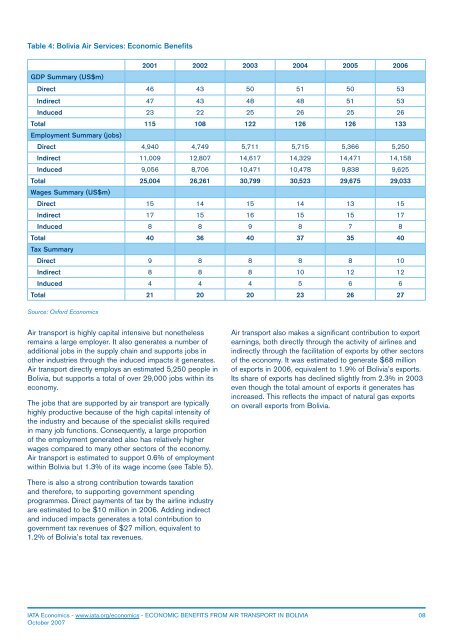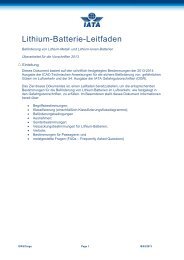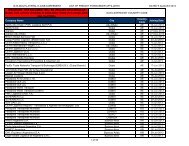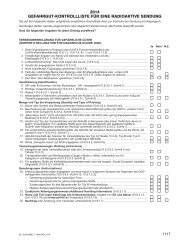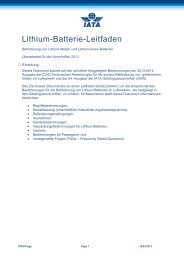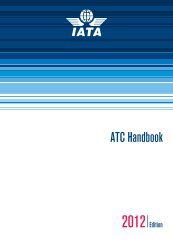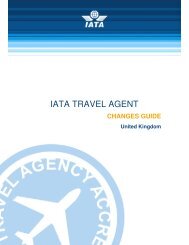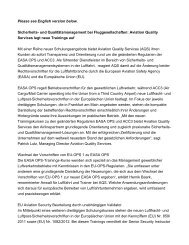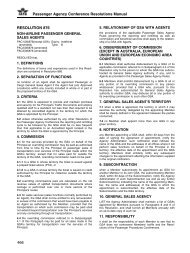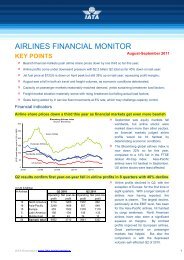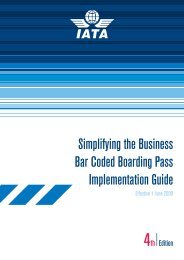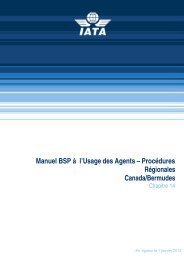ECONOMIC BENEFITS FROM AIR TRANSPORT IN BOLIVIA - IATA
ECONOMIC BENEFITS FROM AIR TRANSPORT IN BOLIVIA - IATA
ECONOMIC BENEFITS FROM AIR TRANSPORT IN BOLIVIA - IATA
You also want an ePaper? Increase the reach of your titles
YUMPU automatically turns print PDFs into web optimized ePapers that Google loves.
Table 4: Bolivia Air Services: Economic Benefits<br />
2001 2002 2003 2004 2005 2006<br />
GDP Summary (US$m)<br />
Direct 46 43 50 51 50 53<br />
Indirect 47 43 48 48 51 53<br />
Induced 23 22 25 26 25 26<br />
Total 115 108 122 126 126 133<br />
Employment Summary (jobs)<br />
Direct 4,940 4,749 5,711 5,715 5,366 5,250<br />
Indirect 11,009 12,807 14,617 14,329 14,471 14,158<br />
Induced 9,056 8,706 10,471 10,478 9,838 9,625<br />
Total 25,004 26,261 30,799 30,523 29,675 29,033<br />
Wages Summary (US$m)<br />
Direct 15 14 15 14 13 15<br />
Indirect 17 15 16 15 15 17<br />
Induced 8 8 9 8 7 8<br />
Total 40 36 40 37 35 40<br />
Tax Summary<br />
Direct 9 8 8 8 8 10<br />
Indirect 8 8 8 10 12 12<br />
Induced 4 4 4 5 6 6<br />
Total 21 20 20 23 26 27<br />
Source: Oxford Economics<br />
Air transport is highly capital intensive but nonetheless<br />
remains a large employer. It also generates a number of<br />
additional jobs in the supply chain and supports jobs in<br />
other industries through the induced impacts it generates.<br />
Air transport directly employs an estimated 5,250 people in<br />
Bolivia, but supports a total of over 29,000 jobs within its<br />
economy.<br />
The jobs that are supported by air transport are typically<br />
highly productive because of the high capital intensity of<br />
the industry and because of the specialist skills required<br />
in many job functions. Consequently, a large proportion<br />
of the employment generated also has relatively higher<br />
wages compared to many other sectors of the economy.<br />
Air transport is estimated to support 0.6% of employment<br />
within Bolivia but 1.3% of its wage income (see Table 5).<br />
Air transport also makes a significant contribution to export<br />
earnings, both directly through the activity of airlines and<br />
indirectly through the facilitation of exports by other sectors<br />
of the economy. It was estimated to generate $68 million<br />
of exports in 2006, equivalent to 1.9% of Bolivia’s exports.<br />
Its share of exports has declined slightly from 2.3% in 2003<br />
even though the total amount of exports it generates has<br />
increased. This reflects the impact of natural gas exports<br />
on overall exports from Bolivia.<br />
There is also a strong contribution towards taxation<br />
and therefore, to supporting government spending<br />
programmes. Direct payments of tax by the airline industry<br />
are estimated to be $10 million in 2006. Adding indirect<br />
and induced impacts generates a total contribution to<br />
government tax revenues of $27 million, equivalent to<br />
1.2% of Bolivia’s total tax revenues.<br />
<strong>IATA</strong> Economics - www.iata.org/economics - <strong>ECONOMIC</strong> <strong>BENEFITS</strong> <strong>FROM</strong> <strong>AIR</strong> <strong>TRANSPORT</strong> <strong>IN</strong> <strong>BOLIVIA</strong><br />
October 2007<br />
08


